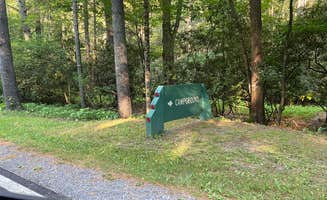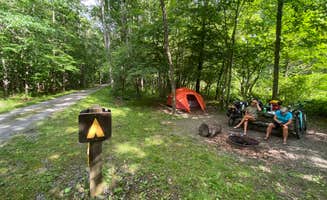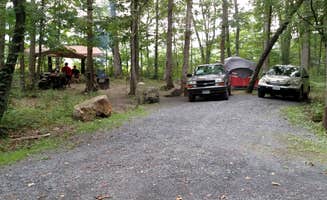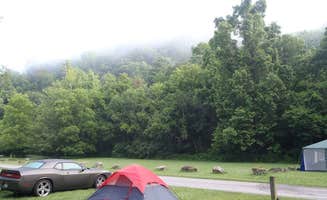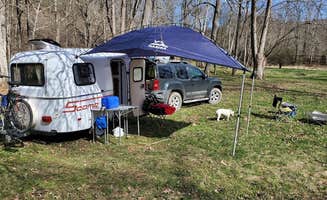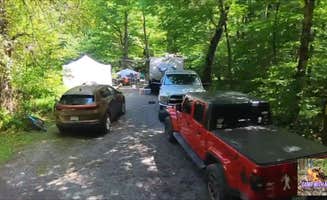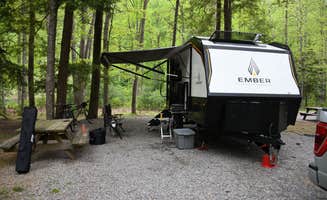Monongahela National Forest campgrounds range from 2,500 to 4,800 feet in elevation, creating distinct ecological zones with temperature variations that affect camping conditions throughout the seasons. Primitive camping areas along the Greenbrier River Trail feature Adirondack-style shelters at specific mileposts with hand-pumped well water, pit latrines, and raised tent pads with pea gravel. Many dispersed sites in the forest require visitors to be fully self-sufficient with no water or bathroom facilities available.
What to do
Kayaking at Lake Moomaw: Visitors at Bolar Mountain Recreation Area can rent kayaks at the marina to explore the lake's secluded coves. "We rented kayaks at the marina/camp store down the road and explored a little cove that was really cool. We blocked out 4 hours, but only lasted 2 hours before we got tired and returned the kayaks," notes Joanna G.
Wildlife viewing at dawn and dusk: The primitive sites along the Greenbrier River Trail at MP 69.6 offer exceptional wildlife spotting opportunities. "Camping along the Greenbrier River affords great wildlife viewing at dawn and dusk when the animals head to the water to drink. The amount of wildlife we saw throughout the day was incredible while biking the trail. Mostly deer, rabbit, chipmunks and Eastern Box Turtles sharing the trail...but we did see a few turkey, fox and bobcat," reports Dave V.
Mountain biking on maintained trails: Dispersed camping at Mower Basin provides direct access to well-maintained mountain biking trails. "It has a small network of single track trails for anyone with a bike... The trails were well maintained and offered a wonderful variety of wooded and open space riding," shares Jon N. Another camper adds, "There is a gorgeous network of trails defined as multi-use but designed particularly for mountain bikers, complete with berms, moguls, and generally sufficient width for navigating without hanging up a handlebar."
What campers like
Unique accommodations: The Thorny Mountain Fire Tower at Seneca State Forest stands at 3,458 feet elevation with 360-degree views. "Renting and staying in the Thorny Mountain Fire Tower is a special opportunity... Nearly 70 steps up the structure brings you to 3507 ft. From that height, you get to enjoy long mountain views in both West Virginia and Virginia. The tower cabin structure has 360 views...11 windows and a windowed door," explains Dave V.
Remote, secluded sites: Mower Basin's dispersed camping offers true isolation. "Many of the sites are legitimately dispersed, i.e. nowhere near other campsites, and sometimes not even visible from the main dirt road," says one camper, while another notes, "The sites are so spread out/the foliage is so thick that you can't see or hear anyone."
Private swimming access: Lakeside sites often include water access for swimming. At Bolar Mountain, one camper reports, "Campground 2 site 53, has a nice private beach area where you can go fishing or swim. Bring water shoes, the rocks can be sharp." Another camper adds, "The water was beautiful, temperature perfect for swimming. There's a separate beach that you can drive to that is roped off for swimming purposes but we rather enjoyed walking to the water from our site and having what seemed like our own little swimming spot."
What you should know
Limited or no connectivity: Cell service is virtually nonexistent throughout much of the forest. At Riverside Campground in Watoga State Park, "It's in a valley, so there's no cell service. The wash houses have wi-fi, but it's not great and you have to be either in the building or sitting at the bench outside to use it," according to Julie. Another camper notes, "Because this entire area of WV is in the National Radio Quiet Zone, there is zero cellular service within 1-2 hours drive in any direction."
Weather variations and preparedness: Temperatures can drop significantly, especially at higher elevations. One camper at Mower Basin advises, "Because of its remoteness and high altitude, it could be impassable for any vehicle in winter when there's heavy snow." At Greenbrier River Trail, a reviewer notes, "In June, you can anticipate random, short afternoon or evening cloudbursts...but they can be gully-washers. Nights were cool and most mornings I wore a long-sleeve Merino shirt."
Well water and pit latrines at primitive sites: The primitive campsites along the Greenbrier River Trail feature basic but functional facilities. "Newer Adirondack Style Shelter, newer large/clean/stocked pit latrine, raised tent pad (pea gravel), cold well water - hand pump, metal fire ring," lists Dave V. when describing the amenities at milepost 63.8.
Tips for camping with families
Wildlife encounters as educational opportunities: Seven Mile Campground in Seneca State Forest offers abundant wildlife sightings. "It is very serene, songbirds singing nonstop even past dusk," reports Dave V. Children can observe various forest animals in their natural habitat, with one camper at Seneca State Forest reporting, "Encountered 19 deer, 1 bear, and several other small creatures" during their stay.
Consider reserving a cabin for younger children: Pioneer cabins at Seneca State Forest provide a more sheltered option while still offering a rustic experience. "We stayed in a cabin this time. One of the pioneer cabins. Let me say it was awesome, wood stove, gas light, outhouse and had to get your own water. The cabin was well put together and the staff has you set up to enjoy your stay with everything from soap to cut wood," shares David F.
Select sites with lake or water access: Water features provide natural entertainment for children. At Douthat State Park, a camper notes, "The lake is nice, and there is nice hiking along the shore." Another reviewer mentions it's "a great place for kids" with "fishing, lake swimming, hiking, educational opportunities galore."
Tips from RVers
Know your site dimensions: Many campgrounds have limited space for larger rigs. Jeremy W. notes about Douthat State Park, "Whispering Pines is a few miles away along the entry road and has a different character. It's a very flat and wide-open campground perfect for big RVs with much larger sites." He also cautions, "Caution should be used with large rigs as the low-water bridge to White Oak has steep approach and departure angles."
Prepare for limited hookups: Most forest campgrounds offer minimal amenities for RVs. At Riverside Campground in Watoga State Park, "Most RV sites have electric, and water fill stations are easily accessible," but as another camper points out, "No sewer, no water at site. Water available, sewer dump station available."
Weather and road conditions affect access: Forest roads can be challenging after rain or during winter months. At Mower Basin, one reviewer advises, "Because of the roughness of the road to get up to Mower Basin, I doubt you could easily get a large motorhome up here, but I have seen MANY fifth wheel or campers up to 25 feet in length. I wouldn't call the road four-wheel-drive, high clearance terrain, but it is fairly rotted, so you want to drive slow."


